Related Research Articles

"Get Ready" is a Motown song written by Smokey Robinson, which resulted in two hit records for the label: a U.S. No. 29 version by The Temptations in 1966, and a U.S. No. 4 version by Rare Earth in 1970. It is significant for being the last song Robinson wrote and produced for the Temptations, due to a deal Berry Gordy made with Norman Whitfield, that if "Get Ready" did not meet with the expected degree of success, then Whitfield's song, "Ain't Too Proud to Beg", would get the next release, which resulted in Whitfield more or less replacing Robinson as the group's producer.
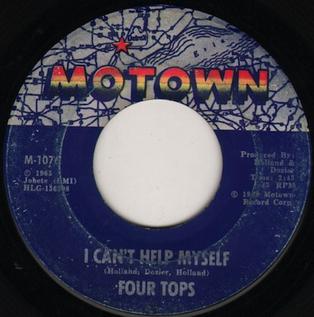
"I Can't Help Myself" is a 1965 song recorded by the Four Tops for the Motown label.

"Land of a Thousand Dances" is a song written and first recorded by American rhythm and blues singer Chris Kenner in 1962. It later became a bigger hit in versions by Cannibal & the Headhunters and Wilson Pickett. A version by Thee Midniters reached number 27 in Canada on March 22, 1965.

"You'll Never Find Another Love Like Mine" is a song written by Kenny Gamble and Leon Huff and performed by R&B singer Lou Rawls on his 1976 album All Things in Time. The song proved to be Rawls' breakthrough hit, reaching number 1 on both the R&B and Easy Listening charts as well as number 4 on the dance chart and number 2 on the US Billboard Hot 100. This was the first and only time that one of Rawls' records reached Billboard's pop Top Ten.

"Pick Up the Pieces" is a song by the Average White Band from their second album, AWB. On the single, songwriting credit was given to founding member and saxophonist Roger Ball and guitarist Hamish Stuart individually and the entire band collectively. It is essentially an instrumental, apart from the song's title being shouted at several points in the song.
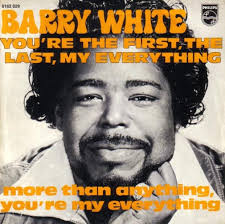
"You're the First, the Last, My Everything" is a song recorded by American singer and songwriter Barry White from his third studio album, Can't Get Enough (1974). The song was written by White, Tony Sepe and Peter Radcliffe and produced by White. It reached number two on the US Billboard Hot 100 and number one on the UK Singles Chart. The song was certified Gold by the Recording Industry Association of America (RIAA) in 1974, and certified silver by the British Phonographic Industry (BPI), also in 1974.

"It Only Takes a Minute" is a 1975 song by American soul/R&B group Tavares, released as the first single from their third album, In the City (1975). The song was the group's only top-10 pop hit in the United States, peaking at number 10, and their second number one song on the American soul charts. On the US Disco chart, "It Only Takes a Minute" spent five weeks at number two and was the first of four entries on the chart. The song was subsequently covered by Jonathan King performing as 100 Ton and a Feather in 1976 and by boy band Take That in 1992.
"The Blues" is a number-one R&B single by the band Tony! Toni! Toné!. The song spent one week at number one on the U.S. R&B singles chart and peaked at number 46 on the Billboard Hot 100 in 1990. The single also peaked at number 43 on the Hot Dance Club Play chart, and number 92 on the UK Singles Chart.

"Take Your Time (Do It Right)" is the debut single by American R&B group the S.O.S. Band. It was released as the lead single from their debut studio album, S.O.S. (1980) on March 18, 1980 through Tabu Records, three months before the album's release.

"I'll Be Good to You" is a 1976 hit song by R&B duo the Brothers Johnson. George Johnson, one of the two Johnson brothers in the band, wrote the song after deciding to commit to a relationship with one woman, instead of dating several at a time. While George was recording a demo for the song, family friend Senora Sam came by and added some lyrics. Brothers Johnson producer and mentor Quincy Jones heard the song, liked it, and convinced George to sing lead on the finished track. Released from their debut album, Look Out for #1, it was a top-ten hit on the Billboard Hot Singles Charts, peaking at number three, and a number one song on the Billboard R&B Charts during the summer of 1976. The single was later certified gold by the RIAA.
"Get Off" is a song by American disco band Foxy, released in 1978. The background vocals were performed by Wildflower. Released from their LP of the same name, the song became a crossover hit. It spent two weeks at number one on the Billboard Hot Soul Singles chart during the fall of that year and also peaked at number nine on the Billboard Hot 100 singles chart. Along with the track, "Tena's Song", "Get Off" peaked at number 18 on the disco chart.
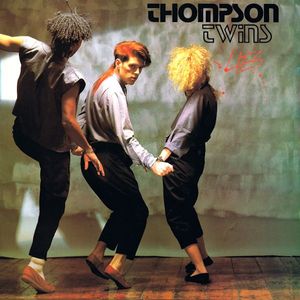
"Lies" is a song by the British pop band Thompson Twins. It was released as the first single from their third studio album Quick Step & Side Kick, and the song peaked at number 67 on the UK Singles Chart. The single fared better in the United States, where it peaked at number 30 on the Billboard Hot 100 chart in the spring of 1983. Along with the B-side track "Beach Culture", "Lies" also spent two weeks at number one on the American dance chart in January 1983, becoming the band's second number one on this chart.
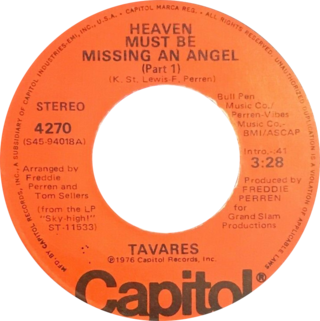
"Heaven Must Be Missing an Angel" is a disco song written by Freddie Perren and Keni St. Lewis. It was recorded by the American band Tavares in 1976. It was released as the first single from their fourth album, Sky High! (1976), and was split into two parts: the first part was 3 minutes and 28 seconds in length, while the second part was 3 minutes and 10 seconds. "Heaven Must Be Missing an Angel" was re-released in February 1986.

"Circles" is a song by the American band Atlantic Starr, and the first single released from their 1982 album Brilliance. The single was the most successful for the group thus far, peaking at number two for two weeks on the Soul Singles chart and it also became their first single to hit the Billboard Hot 100, peaking at number 38. "Circles" was also Atlantic Starr's most successful single on the dance charts, peaking at number nine.
"Inside Love " is a song written by Kashif, and performed by American R&B singer George Benson.
"Don't Let Go" is a song written by Jesse Stone. The song was first a hit for Roy Hamilton in 1958. The Roy Hamilton version reached number 2 on the R&B charts and number 13 on the pop charts.
"Darlin'" is a song written in 1970 by English sax player Oscar Stewart Blandamer. It was first released under the title "Darling" by the British country band Poacher in 1978. It was later a chart hit for Frankie Miller and David Rogers. The track was subsequently recorded by numerous artists including Tom Jones, Barbara Mandrell, Smokie and Johnny Reid.

"Treat Her Like a Lady" is a 1984 single by American vocal group by the Temptations. Released on November 6, 1984 but airplay October 1984, this is the first single on which Ali-Ollie Woodson was lead singer. The song appears on Temptations' album Truly for You, also released in 1984. The song was co-written by Woodson and Otis Williams, and was co-produced by Woodson and former Earth, Wind & Fire member Al McKay and Ralph Johnson.
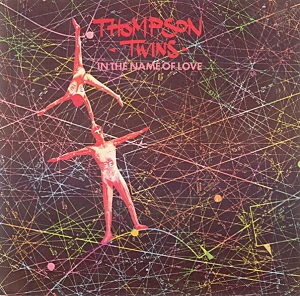
"In the Name of Love" is a 1982 single written and performed by British pop band Thompson Twins, at the time a septet. It was the first of twelve entries on the Billboard Dance chart for the group.
"Run Away" is a 1977 disco single written by Ronnie James and Vincent Montana, Jr. and performed by the Salsoul Orchestra with featured vocals by Loleatta Holloway. The single was from the band's Magic Journey album. Along with the tracks, "Magic Bird of Fire", and "Getaway", "Run Away" went to #3 on the US disco chart. On the soul chart, "Run Away" peaked at #84.
References
- ↑ Whitburn, Joel (2004). Hot Dance/Disco: 1974-2003. Record Research. p. 247.
- ↑ Whitburn, Joel (2004). Top R&B/Hip-Hop Singles: 1942-2004. Record Research. p. 553.